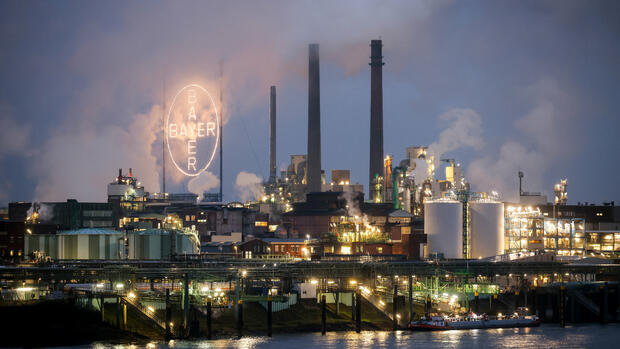Dusseldorf Bayer is lowering its outlook for 2023: Because of the “massive drop in sales of glyphosate-based products”, the Leverkusen-based pharmaceutical and chemical group is now only assuming sales of between 48.5 and 49.5 billion euros. So far, the expectation was 51 to 52 billion euros.
The result will be between 11.3 and 11.8 billion, the free cash flow at zero euros – the Dax group had expected three billion euros here. Bayer communicated the deteriorated forecast on Tuesday a good two weeks before the publication of the half-year figures.
It is the first major challenge for Bayer CEO Bill Anderson, who only succeeded Werner Baumann on June 1. Anderson’s mission: somehow prettify the damned glyphosate business.
The drug, which the Leverkusen-based pharmaceutical and chemical company integrated with the takeover of Monsanto for more than 60 billion dollars, not only destroys weeds, but also company value. Bayer has spent and deferred billions in litigation. Responsible for the takeover was Baumann, who ultimately lost his top job.
Glyphosate weighs on Bayer’s business
Analysts had already expected the annual targets to be adjusted. Prices for products containing the weed killer glyphosate, which boosted business last year, have fallen. At the same time, demand fell: poor weather conditions resulted in poor harvests. So farmers had less to protect against weeds. In addition, customers had accumulated high inventories and hardly had to buy more. This phenomenon is currently burdening the entire chemical industry.
The US company FMC Corporation, which specializes in crop protection products, issued a profit warning at the beginning of July. The profit warning from BASF is also likely to result in part from the currently poor business with crop protection products, says Markus Mayer from Baader Bank.
At Bayer, the problem is once again glyphosate. Union Investment, one of the largest shareholders in the Dax group, is already talking about a “really bad start” for the new CEO. “In his first quarterly results, he must immediately lower the outlook and reduce the expected free cash flow to zero,” commented fund manager Markus Mann, according to the Reuters news agency.
>> Read here: Why things are going badly in the chemical industry – and how the industry will continue
At the same time, the major shareholder does not see Anderson himself to blame for the poor start: “The question arises as to why the old management did not give him a better start with a more realistic outlook.”
But there is also an opportunity: Bad numbers at the beginning of his career, which he can then improve later, could make Anderson appear as a savior.
Bayer split-up rumours
But first, Bayer has to write off 2.5 billion euros, mainly because of the glyphosate business, as the company reports. According to the company, this will lead to a loss of around two billion euros in the second quarter of 2023. Company insiders speculate that the agribusiness write-down is a preparation to clean up the balance sheet ahead of a potential spin-off.
The company currently consists of three divisions: Pharma, Crop Science (the agricultural division) and Consumer Health, which mainly sells non-prescription products such as dietary supplements. Activist investors have long been calling for Bayer to split up, and there are always rumors that the company could take this step.
The agricultural division, it is said, is to be split off and taken to the stock exchange. But because of the high level of legal uncertainty about glyphosate, such a spin-off seems difficult. Even if there was a positive sign for the herbicide recently: the highest EU food authority has classified it as not dangerous for humans and the environment. Since then, renewed approval in the EU – the previous one expires in December – seems more likely.
Bayer needs new medicines in the pharmaceutical sector
In any case, Anderson’s focus could be more on the pharmaceutical sector in order to save the balance sheet. The manager previously worked for the US biotechnology company Biogen, Genentech and was most recently CEO of the Swiss pharmaceutical company Roche.
Such a focus also seems urgently needed: the patents for Bayer’s sales drivers in the pharmaceutical segment, the stroke drug Xarelto and the eye medicine Eylea, are about to expire.
>> Read here: Bayer reports success in first cell therapy against Parkinson’s disease
From then on, other pharmaceutical companies will also be allowed to produce the drugs – which will reduce sales for the developer of the drug. Bayer urgently needs new blockbuster drugs beforehand, i.e. those that bring in more than one billion euros in sales.
Bayer’s hopes are currently resting on the anticoagulant Asundexian, which could become a successor to Xarelto. Bayer is also increasingly focusing on cell and gene therapies: although they are promising, they initially cost billions of euros in research. The goals of the Dax group in this area are ambitious: By 2030, sales in the pharmaceutical sector should grow by 50 percent. If the agricultural business continues to weaken, Bayer will have to deliver more in the pharmaceutical sector.
More: Acquittal for Bayer? EU food authority sees no cancer risk
